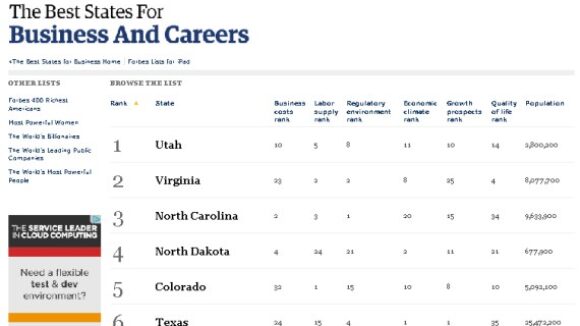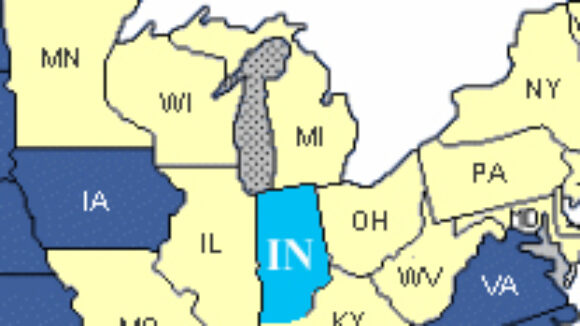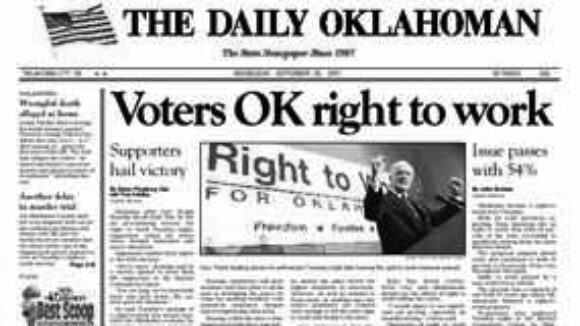Indiana ranked 49th in growth prospects by Forbes
When Forbes studied The Best States for Business and Careers, Indiana ranked 34th. Indiana ranked 49th in economic growth prospects. A Right To Law Act would change its 49th ranking. The…

When Forbes studied The Best States for Business and Careers, Indiana ranked 34th. Indiana ranked 49th in economic growth prospects. A Right To Law Act would change its 49th ranking. The…

Indiana Right to Work in 2012? It is looking more likely that the Indiana Governor, House, and Senate are going to bring workplace freedom to Hoosiers and sign into law a Right to Work Act next year. From Mary…
Art Education Association of Indiana union official Buffy Rogers at the 45 minute sign wave. Amanda Hamon of the Indianapolis Journal & Courier does little but regurgitate comments from a hand full of union officials standing around holding signs for…
Art Education Association of Indiana union official Buffy Rogers at the 45 minute sign wave. Amanda Hamon of the Indianapolis Journal & Courier does little but regurgitate comments from a hand full of union officials standing around holding signs for…

Big labor and the Democratic Party in Indiana are working together to try to stop the state from becoming the 23rd Right to Work state in…

In 2001, Sooners defied Big Labor by approving a statewide ban on forced union dues. Since its Right to Work law took effect, Oklahoma has become a national leader in private-sector compensation and job growth. Oklahoma Celebrates Right to Work Anniversary -- Sooner Experience Reinforces Case For Federal Forced-Dues Repeal (Source: October 2011 NRTWC Newsletter) On September 25 a decade ago, one of Big Labor's most formidable fear-and-loathing campaigns ever failed when Oklahoma approved a statewide ban on compulsory union dues and fees and thus became the nation's 22nd Right to Work state. Almost immediately, the very union bosses who had been shrilly predicting that a Sooner Right to Work law would swiftly lead to disaster moved to prevent the law from having any impact at all. When the Right to Work law had been in effect just seven weeks, Big Labor lawyers launched an underhanded bid to overturn it. This legal attack kept the law's future under a cloud for an extended period. The state's attorneys and Right to Work attorneys intervening on behalf of several independent-minded workers prevailed in 2003 when the Oklahoma Supreme Court unanimously rejected AFL-CIO union kingpins' demand that it overturn the law. Oklahoma's Private-Sector Compensation Growth Has Far Outpaced U.S. Average "Since Big Labor's legal assault on Oklahomans' Right to Work was thwarted, the state has had one of the strongest economies in the country, as measured by a number of key indicators," said Greg Mourad, vice president of the National Right to Work Committee. "For example, from 2003 to 2010, inflation-adjusted U.S. Commerce Department data show private-sector employer outlays for employee compensation, including wages, salaries, benefits and bonuses, grew by 12.2% in Oklahoma, after adjusting for inflation. "Sooners' real private-sector compensation expanded at a rate more than three-and-a-half times as great as the national average of 3.4%, and faster than in 41 other states." Oklahoma Also a Standout For Job Creation

In 2001, Sooners defied Big Labor by approving a statewide ban on forced union dues. Since its Right to Work law took effect, Oklahoma has become a national leader in private-sector compensation and job growth. Oklahoma Celebrates Right to Work Anniversary -- Sooner Experience Reinforces Case For Federal Forced-Dues Repeal (Source: October 2011 NRTWC Newsletter) On September 25 a decade ago, one of Big Labor's most formidable fear-and-loathing campaigns ever failed when Oklahoma approved a statewide ban on compulsory union dues and fees and thus became the nation's 22nd Right to Work state. Almost immediately, the very union bosses who had been shrilly predicting that a Sooner Right to Work law would swiftly lead to disaster moved to prevent the law from having any impact at all. When the Right to Work law had been in effect just seven weeks, Big Labor lawyers launched an underhanded bid to overturn it. This legal attack kept the law's future under a cloud for an extended period. The state's attorneys and Right to Work attorneys intervening on behalf of several independent-minded workers prevailed in 2003 when the Oklahoma Supreme Court unanimously rejected AFL-CIO union kingpins' demand that it overturn the law. Oklahoma's Private-Sector Compensation Growth Has Far Outpaced U.S. Average "Since Big Labor's legal assault on Oklahomans' Right to Work was thwarted, the state has had one of the strongest economies in the country, as measured by a number of key indicators," said Greg Mourad, vice president of the National Right to Work Committee. "For example, from 2003 to 2010, inflation-adjusted U.S. Commerce Department data show private-sector employer outlays for employee compensation, including wages, salaries, benefits and bonuses, grew by 12.2% in Oklahoma, after adjusting for inflation. "Sooners' real private-sector compensation expanded at a rate more than three-and-a-half times as great as the national average of 3.4%, and faster than in 41 other states." Oklahoma Also a Standout For Job Creation

From Nelson Peters an Allen County commissioner written for The Journal Gazette: One of the nation’s leading business relocation firms reports that between 33 percent and 50 percent of businesses seeking…

From Nelson Peters an Allen County commissioner written for The Journal Gazette: One of the nation’s leading business relocation firms reports that between 33 percent and 50 percent of businesses seeking…